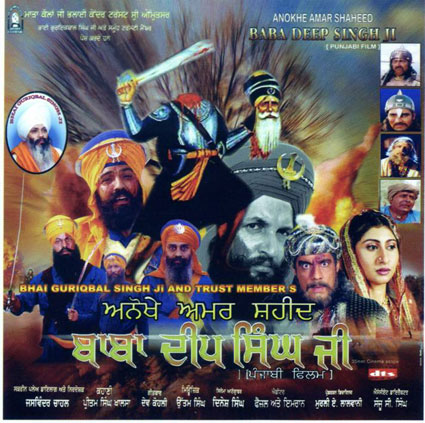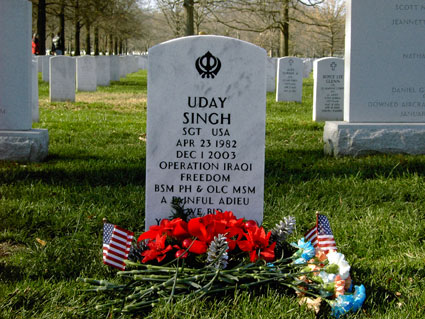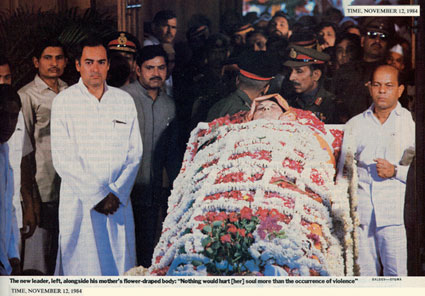22 years have passed, but yet it seems like yesterday for me when remembering the events of late October and early November of 1984.
Unfortunately, I feel like one of the unlucky ones who experienced the anti-Sikh time period in India during the year of 1984. As a young child, I vividly remember watching the television set in despair as the Sikhs’ Golden Temple complex was desecrated and innocent Indian citizens were slaughtered only because they were Sikhs.
To this day I recall asking my Mother as I watched those haunting images on the television, "If we too are Indians, then why are they attacking us?"
October 31st, 1984 is the day Indian Prime Minister Indira Gandhi was assassinated by her Sikh bodyguards, Beant Singh and Satwant Singh. History has it that Prime Minister Gandhi's famous last words were "If I die today, every drop of my blood will invigorate the nation."
The dead Indira Gandhi with her son, Prime Minister Ranjiv Ghandi
(Time Magazine, November 1984).
Literally she was correct; however, the nation of India had already been invigorated months before the day she died.
In June 1984, Gandhi foolishly ordered
a military attack on the Golden Temple where she claimed to the world that Sikh militants were trying to build a state within a state. But she never revealed to the world why those Sikhs were upset, or how the Sikhs felt undermined from the time of India's Partition where their land was divided in half. She never revealed how those Sikhs were repeatedly lied to with a sequence of false promises of specific civil liberties.
To make matters worse, a series of Sikhs became agitated only because they felt that their elected government leaders were not listening to the inquiry of their citizens leading to the call for more State’s rights. Only after a series of democratic and peaceful protests conducted
by the majority of Sikhs, she made the extreme decision to attack the Golden Temple complex as militants resorted to arming themselves as a last alternative. And only so that their voices could be heard on the international stage.
Sikh defenders at the Golden Temple complex
(Time Magazine, June 1984).
It's funny how a story can be altered when looking at the other side of the coin to formulate the bigger picture.
So with the devastating destruction of the Sikhs’ most holiest buildings from her attack, it left many Sikhs feeling that their Homeland had betrayed and isolated them in their own birthplace. Gandhi had symbolically wounded them by destroying and undermining the Sikhs’ holy Golden Temple complex.
As these feelings of invigoration grew from the Golden Temple attack, it was only a matter of time before a reaction was to occur... which turned out to be an unfortunate one.
With the assassination of Indira Gandhi 1984, it brought several days of true terror to the first week of November in India. Both Democracy and Harmony were left with no manpower and not enough water to put out the fires of anguish and vengeance that the Indian society felt. At a time of National crisis for young India, angry mobs looted Sikh homes and businesses throughout India with the worst happening in Delhi. After several days of anarchy, 3000 Sikhs were killed only because they were members of the Sikh faith just like Beant Singh and Satwant Singh.

Sikh households destroyed in the aftermath of Indira Gandhi's assassination
(Time Magazine, November 1984).
Sikh men were forced off of buses and trains and were decapitated. Other Sikh men
had to face other forms of horrendous torture such as being restrained with tires while being doused with gasoline and lit on fire to be burnt alive.
Sikh women were also not spared as many were violently raped while being forced to watch either their husbands and children killed by the angry mobs. Worst of all, evidence has been coming forward that the mobs were organized and controlled by blood thirsty
government officials.
All while the world watched and did nothing, thinking they had nothing to gain out of the situation. Humanity lost in 1984, just like it has been lost in
Rawanda,
Gujrat, and now in
Sudan.
Although this event in 1984 was an Anti-Sikh movement, it’s ironic to know that there were stories of hope. For example, I have personally met several individuals who risked their lives and bravely stepped up to the noble cause of personally guarding Sikh homes when the mobs came.
The rioting after Indira Gandhi's death
(Time Magazine, November 1984).
So 22 years later with no individuals brought to justice from the turmoil of late October/early November of 1984 in India, one can only hope that sometime soon all the guilty can be caught and prosecuted.
I just hope that this can happen in my lifetime.
At this year's remembrance of Indira Gandhi at her memorial shrine, Congress supporters were shouting "
Long live Indira!". However, these statements are tainted after understanding the actions that she took which ultimately led to her demise.
In summary I don't cry for the death of Indira Gandhi, for the action as to why this happened can be comprehended.
But upon reflection, I cry because India’s turmoil of 1984 is all blamed on how India's young democracy failed at that time period.








































